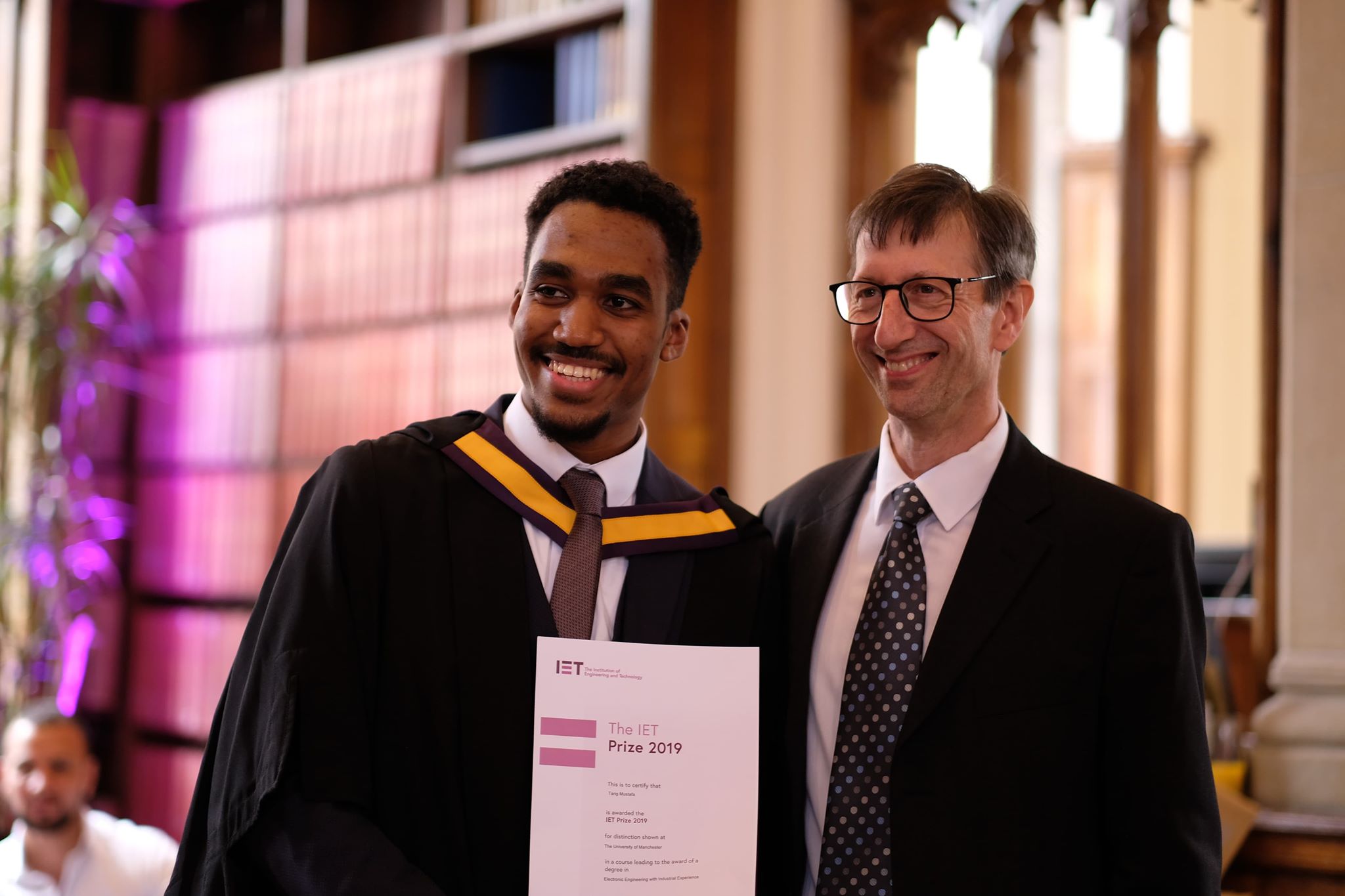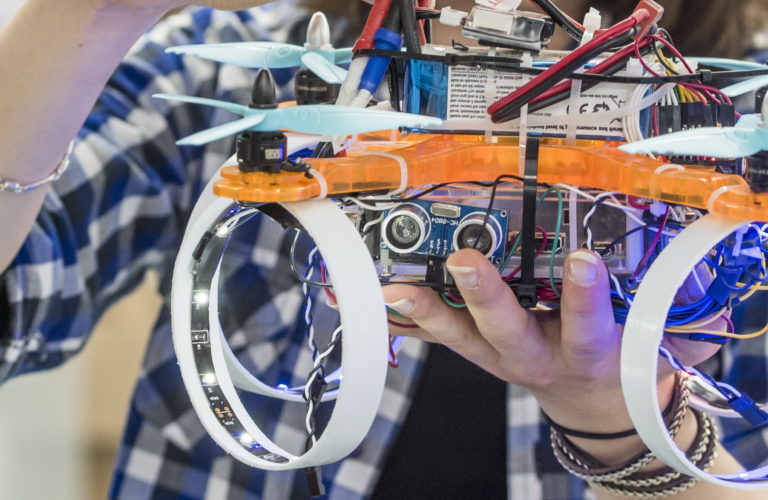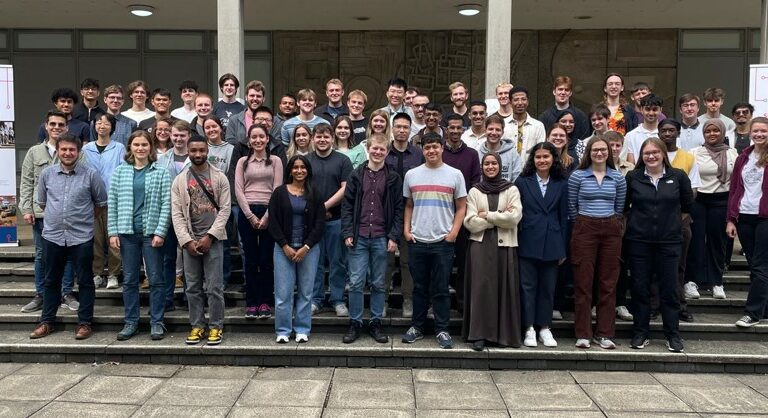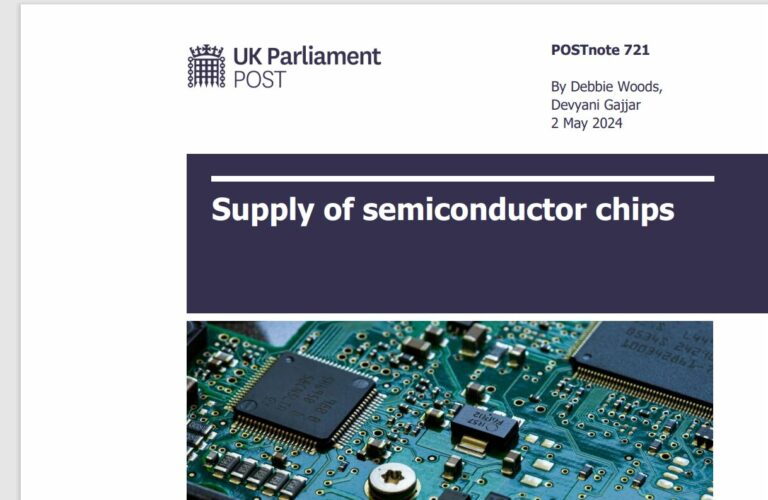Graduated UKESF Scholar Tarig Mustafa was named one of this year’s IET Prize winners for attaining the highest grade of all graduating students from the Department of Electrical and Electronic Engineering at the University of Manchester, 2019. The Prize is awarded annually to outstanding students who are completing IET-accredited courses and who are nominated by their university. It includes two years’ free membership of The IET.
Tarig achieved a First Class BEng in Electronic Engineering, and was also awarded an Outstanding Academic Achievement Award by his university for graduating among the top ~0.5% of students across all departments. As a UKESF Scholar, Tarig was sponsored by Renesas Electronics. He is now undertaking a PhD in the field of Nanoscience and Nanotechnology at the University of Cambridge.

Tarig receiving The IET Prize 2019
Tarig shares his experiences in Electronics at university and as a UKESF Scholar in the blog post below.
Why Electronics
I always enjoyed Physics and understanding the fundamental laws that govern our world. Even more so, I take inspiration from learning about the clever and innovative ways in which people have managed to exploit them, setting the scene for today’s technological advancements. It was clear to me that I should pursue a career in Engineering from an early age. However, at the time of applying to university I had no idea which branch of engineering would be right for me. I had no experience related to any of them. In fact, I applied for Mechanical Engineering as a sort of default, and it wasn’t until I had received my offer that I requested to have it switched to the School of Electrical and Electronic Engineering. What motivated the switch? Nothing special, I was just lucky to have a family member who studied Control Engineering at the same university, with whom I was able to discuss the course and career options in more depth (also a couple of mates of mine made the switch too). Best decision ever.
Applying to the UKESF
I first heard about the UKESF when it was advertised in my first year at university. I felt it presented the perfect opportunity to expose myself to the industry and develop networks whilst still an undergraduate. After being unsuccessful in my first year, I applied again in my second year; more mature with a clearer career goal in mind. This time, I had a summer’s worth of volunteer experience, working as a research assistant at my university (graphene-silicon Schottky photodetector micro opto-electromechanical systems research). The experience helped me to confirm my desire to pursue a career in semiconductors and electronic materials research. Thus, I applied to companies with overall focuses that coincided with my new career aim. The specific placement opportunities I applied to were in areas of Electronics I found I really enjoyed from my university modules and by participating in local hackathons (including computer architecture, embedded systems and programming). There weren’t many electronic materials placements available, which is fine because I could easily get that sort of experience at university. Also, it was important for me to ascertain my career decision by giving a chance to the other areas of Electronics I enjoyed and tasting life as an engineer working in those fields.
Working at Renesas
I was lucky to be accepted for my first choice working for the software development team at Renesas Electronics. We made software drivers for the company’s ARM-based microcontrollers for engineering customers. I was also lucky enough to write bespoke additions to accommodate some interesting customer requests. It was a real mental exercise, great fun and lots of C! The community at Renesas was more than I could have ever asked for (big shout out to everyone in the ARM SDK team! – the most wonderful team in the whole office). I was blessed to be given loads of responsibility and not treated like a student at all. Even then, everyone was super friendly and helpful, it hardly felt like work at all. I was also part of a community of ten students at the office (all through the UKESF), needless to say we all became really close friends and share so many awesome memories together.
By participating in business review meetings, general conversation with colleagues and attending the UKESF Scholar Workshop, I gained a much wider and deeper understanding of the industry than I could have obtained otherwise through university. This was really important for me as I was debating whether or not to follow my career aspirations through industry or to take an academic route. Although I have decided to remain in academia, that insight is still of particular importance to me as it is the industry that drives research in my field. Having decided to remain in academia I immediately enrolled myself on another voluntary research assistant role for the summer at the university after completing my year in industry (this time, looking at high K dielectric materials for thin film transistors for flexible, transparent displays).
My days at university
In addition to becoming a really confident programmer, the theoretical knowledge I obtained through the practical experience of the work placement directly benefitted me when I returned to university. Large chunks of modules, such as Data networking, concurrent systems and computer systems architecture, were just recapping concepts I already had solidified.
Being originally from Manchester and going to university in Manchester meant I lived a little further out than most. With it being impractical to go home between lectures or labs, I was on campus more than my peers. It wasn’t as depressing as it sounds. I found all sorts of hidden gems, including computer clusters that remained empty even during busy times, ways to get on the roof and soak in awesome views, and the code to the staff common room (haha, I just exposed myself with that one). The Scholarship bursary enabled me to ignore the financial consequences of buying meals and coffee daily; which fuelled me as I worked unhealthy hours on campus (even spending the night more times than I care to admit).
Some of my fondest memories of my undergraduate life was just simply chatting to friends around campus and in PC clusters. We mainly talked about work and deadlines (I procrastinate by talking about the work that I should be doing – as if that somehow justifies procrastinating or is a lesser form of procrastination). Engineering students love complaining about the massive workload, after all. Honestly, the number of deadlines I would have missed if someone didn’t bring them up in these conversations is just scary. As life progresses and everyone goes on to do their own thing, it’s these interactions and the friendships I have formed and cherish so deeply that I will miss the most.



